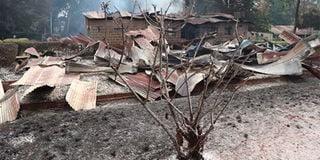Leaders dictate level of civility at varsities

The aftermath of riots by University of Nairobi students who on March 9, 2020 went on the rampage protesting the alleged killing of their colleague by security guards. PHOTO | DENNIS ONSONGO | NATION MEDIA GROUP
What you need to know:
- In the recent past, we have witnessed barbaric behaviour from officials and political leaders.
- Dialogue around the future of open expression on higher education campuses requires us to think beyond surface expressions of civility.
University of Nairobi students recently went on the rampage after their colleague was reportedly murdered by security guards at the main campus.
But while what happened to Kytte Ondeng is unacceptable and inexcusable, it has been rather difficult to have students deal with issues pragmatically. How they reacted to this issue is not the root of the never-ending behaviour at these institutions.
Monkey see, monkey do. It should not come as a surprise to anyone, therefore, that the students caused a ruckus yet again though that is bound to adversely affect them.
With the resulting closure of businesses nearby and a trail of damage on and off campus, strikes often stall studies too as the institution is normally temporarily closed to contain the situation.
SOLUTIONS
Yet, if an incident affecting them occurs again tomorrow, they will not hesitate to run into the streets and riot. In fact, the more valuable the damaged item, the higher the success rate of the protest.
This being an unchanging trend over the years, it is important to delve deep into the issue and get solutions to it.
Monkey see, monkey do, so the saying goes. The students’ behaviour is a direct reflection of the public leaders. One may dismiss that a call for civility as an attempt at silencing the messenger. Far from it, if incivility affects the very messenger in the long run.
In the recent past, we have witnessed barbaric behaviour from officials and political leaders, making us to question whether this is a pre-qualification to a leadership position in this country.
Dialogue around the future of open expression on higher education campuses requires us to think beyond surface expressions of civility. It requires us to put our leaders to task, too, when it comes to how they react in public over an issue that needs to get addressed.
It is no argument that learning institutions should continue to play a role in ensuring that the stipulated code of conduct in respective universities is adhered to.
SMASHED MOBILE PHONE
But as evidenced, it is not enough to ensure university students approach issues differently. Nothing is bound to change if we don’t see a change in how our leaders approach issues such as responding to a peer or subordinate in public.
Not so long ago, we witnessed a leader smash a mobile phone vehemently in full glare of the public, including students watching online. Surprisingly — or, maybe, not surprising anymore — this act was trivialised to a piece of humour and soft ridicule in social media platforms. But isn’t this enough greenlight to students to cause havoc at the universities?
Parents only play a major role when dealing with teenagers and pre-teens but have little or zero control over their young adults, especially with the advent of digital technology.
Key stakeholders — including the university administration, society and corporate bodies — must take student riots seriously. For us to see a change in how student handle themselves in times of unrest, it is important for respective bodies and individuals in leadership to reflect on their conduct in private and public.
Students’ civility is inspired by deep and comprehensive civility by leaders towards their colleagues and the ordinary citizen. We must always task our leaders to be civil if we hope to see a shift in behaviour from our “future leaders” in universities.
Ms Buyole is a PR and Corporate Communications consultant. [email protected].





